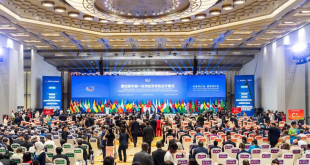
Mariam Saidi Mfaume (2nd R), a five-year-old Tanzanian girl, practises Chinese kung fu with other Tanzanian youths at the Shaolin Temple Tanzania Kung Fu Club in Dar es Salaam, Tanzania, on Nov. 30, 2024. (Xinhua/Emmanuel Herman)
Mariam Saidi Mfaume tightened her tiny fists, took a deep breath, and launched into a flying kick that sliced through the misty air.
Raindrops tapped gently on the leaves above, but nothing could stop the six-year-old from pursuing her kung fu dreams. On a damp evening in the outskirts of Tanzania’s coastal city of Dar es Salaam, while most children were indoors avoiding the elements, Mariam was practicing kung fu with a group of girls, some older and some even younger than her, under the trees. They were being coached by Master SaidiMfaume, Mariam’s father, a martial arts instructor who once trained at China’s legendary Shaolin Temple. For as long as Mariam could remember, kung fu has been a part of her world. “I started training when I was three,” Mariam told Xinhua with a proud grin, her feet slightly apart, hands ready to block or strike on command. “Kung fu is in my blood.” Watching her move, small but precise, focused and confident, it is easy to forget her age. “My favorite move is the flying kick,” Mariam said. “When I jump and kick at the same time, I feel like I’m flying. It makes me feel fast and powerful, just like the kung fu masters I see in movies.” Mariam wants to become a kung fu teacher just like her father. “I want to teach other children, maybe even have my own school one day,” she said, pausing briefly to call over her three-year-old sister Zarha, who recently joined the training sessions. Their dynamic is tender and determined — two girls, tiny but fierce, kicking through the rain as if dancing with the wind. Just a few meters from the children, Makrina Projest wiped the sweat from her brow after a rigorous two-hour training session.
At 21, Projest is the oldest student in the Shaolin Temple Tanzania Kung Fu Club and one of its most committed. Clad in black training pants and a red headband, she adjusted her breathing and smiled. “I always wanted to learn kung fu, ever since I was a little girl watching Chinese martial arts movies on TV.” “But no one supported me,” Projest said. “My parents said it was for men. My relatives promised to enroll me, but never did.” “So when I got my first salary last year, I used it to join this club. It was the best decision I’ve ever made,” she said. For Makrina, another trainee, kung fu is more than physical movement; it is personal empowerment. “I used to be shy, even afraid. Now I feel strong. I walk differently. I carry myself differently,” she said. “It’s not about aggression. It’s about control.” When asked what she dreams of becoming, Makrina did not hesitate. “An instructor. A master. And maybe someday, I’ll visit China myself.”
Master Mfaume, 38, now trains 10 female students ranging in age from three to 21. “When girls come to train, I take it very seriously,” he said. “Many families still think kung fu is not for women. But I’ve seen how it changes lives, especially for girls.” The trainees each have a story, he said, and each story begins with courage. “Some come without uniforms or food. So I provide what I can, sometimes shoes, sometimes ameal. I talk to their parents and convince them that kung fu will not make their daughters violent. It will make them stronger.”
A Dar es Salaam native, Mfaume started his kung fujourney in 2009, and in 2013, he received a three-month training scholarship at Shaolin Temple, which transformed his understanding of martial arts. In 2014, he returned to China for further training in Chinese culture. These experiences enabled him to integrate kung fu into local education and community events.
Beyond its cultural appeal, Mfaume said kung fuholds untapped economic potential. “Many people think it’s just a hobby, but kung fu can open doors, for performance, for tourism, for education,” he said. His club regularly gets invited to perform at festivals, conferences, and Chinese corporate events. The Chinese Embassy in Tanzania has also invited them to take part in cultural celebrations. “There’s demand,” he said. “What we need is support.” Mfaume hopes that kung fuis recognized not just as entertainment, but as an investment in youth empowerment, gender equality, and cultural exchange. As the rain began to ease, the girls lined up for their final routine. Barefoot and determined, they moved in unison, punching, blocking, and kicking in rhythm. Mariam leapt into a flying kick, her face lit with joy. Her father clapped softly, his voice calm and clear. There is something deeply symbolic about a child soaring through the air with such confidence. In a world where opportunities for girls often come with strings attached or doors closed, here in a modest neighborhood in Dar es Salaam, Chinese kung fu has offered not just strength but wings. And as long as there are girls like Mariam, and mentors like Master Mfaume, those wings will only grow stronger.
Xinhua
 Africa -China Review Africa -China Cooperation and Transformation
Africa -China Review Africa -China Cooperation and Transformation
